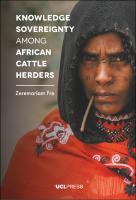Knowledge Sovereignty Among African Cattle Herders
Abstract
Beni-Amer cattle owners in the western part of the Horn of Africa are not only masters in cattle breeding, they are also knowledge sovereign, in terms of owning productive genes of cattle and the cognitive knowledge base crucial to sustainable development. The strong bonds between the Beni-Amer, their animals, and their environment constitute the basis of their ways of knowing, and much of their knowledge system is built on experience and embedded in their cultural practices.
In this book, the first to study Beni-Amer practices, Zeremariam Fre argues for the importance of their knowledge, challenging the preconceptions that regard it as untrustworthy when compared to scientific knowledge from more developed regions. Empirical evidence suggests that there is much one could learn from the other, since elements of pastoralist technology, such as those related to animal production and husbandry, make a direct contribution to our knowledge of livestock production. It is this potential for hybridisation, as well as the resilience of the herders, at the core of the indigenous knowledge system.
Keywords
Cattle; African cattle; Horn of Africa; Beni-Amer; Eritrea; Grazing; Livestock; Pastoralism; Sudan; Traditional knowledgeDOI
10.14324/111.9781787353114ISBN
9781787353114OCN
1045069757Publisher
UCL PressPublisher website
https://www.uclpress.co.uk/Publication date and place
2018Classification
Development studies
Cultural studies: food and society
Rural communities
Anthropology
Social and cultural anthropology
Development economics and emerging economies
Agriculture and farming


 Download
Download